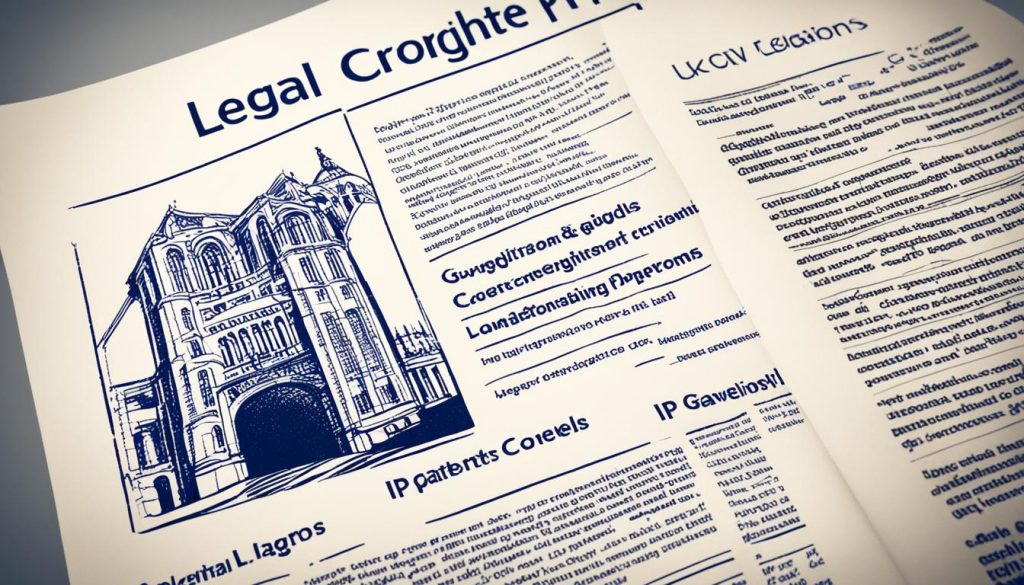In the UK, a detailed system of intellectual property rights supports creativity and innovation. This system is key to growth and protection for original ideas. It ensures that creative work is recognized and kept safe from unfair competition.
Whether you’re working alone or building a business, registering your IP in the UK is vital. It turns your original ideas into valuable property. This article shines a light on how to protect these rights and use them in business.
Introduction to Intellectual Property in the UK

Exploring Intellectual Property (IP) in the UK reveals a system designed to boost innovation and creativity. It grants inventors and creators exclusive rights to their works for a time. This legal support is crucial for acknowledging their efforts and motivating further creative and industrial projects.
Understanding IP rights is vital for anyone dealing with IP law. It covers patents, copyrights, designs, and trademarks. These elements uphold the rights of UK creators and innovators. Knowing this helps people protect their work and explore its business potential.
The UK government, especially through the Intellectual Property Office (IPO), plays a key role. The IPO provides clear ways for securing creators’ rights UK. It offers thorough guidance on protecting creations from the start to worldwide recognition.
- IP law aims to protect intellectual efforts.
- It helps UK creators and inventors secure their rights.
- These rights are crucial for using and making money from IP.
IP protection is not just about legal terms; it values human creativity and its economic impact. With digital media growth, understanding these rights is essential. The IPO’s advice, along with ongoing legal advances, keeps the UK at the forefront of creative and innovative advancement.
Why Protecting Your Intellectual Property Matters

The IP protection importance cannot be stressed enough in the UK’s lively market. It’s the foundation for keeping an edge in a world where ideas are priceless. Making sure innovations are protected keeps the benefits of hard work and strategy with their true owner.
When a company strongly protects its intellectual property, it stops others from using it without permission. This action not only reduces unauthorised use but also shows the firm’s dedication to supporting new ideas. This is vital for firms in tech and creative fields. They rely on safeguarding innovation for growth and to encourage more creativity.
- It stops the brand’s value from being watered down by stopping fake products from entering the market.
- It allows for earning more through licensing deals, turning the IP into money.
- It makes the business more attractive to investors who value protected IP highly.
Also, having a strong IP portfolio can majorly boost a business’s worth. Firms with robust IP assets are often more appealing for investment. They also have a better stance in mergers and purchases.
- Regularly check and update the IP portfolio for full protection.
- Look for strong enforcement methods to ward off IP theft.
- Look into different ways to use the IP, from using it directly to licensing and partnerships.
In conclusion, the IP protection importance is not just about keeping what a business has now. It’s also about setting up for long-term success and maintaining an edge in the global market that keeps changing.
Overview of Patents in the UK

Patents are key in the realm of intellectual property, encouraging and shielding creativity. They protect the unique aspects of new inventions. This allows inventors to enjoy the rewards of their creations in the UK. The path from an idea to getting a patent is well-defined, guided by strict rules.
What is a Patent and What Does it Protect?
A patent gives someone exclusive rights over an invention, which might be anything that introduces a new way of doing something or solves a problem in a new way. In the UK, inventions must be useful, original, and not obvious to someone with typical knowledge in the field to get a patent.
How to Apply for a Patent in the UK
To get a patent, you start by applying at the UK Intellectual Property Office (IPO). This process has several important steps:
- Writing a detailed description of the invention and how it can be used in industry.
- Checking that the invention meets the UK’s patent rules.
- Submitting a patent application with drawings and claims that explain what you want to protect.
- The IPO looks at the application to see if it meets all legal requirements.
- Replying to any issues the IPO has with the application until they are satisfied.
- When everything is approved by the IPO, they will grant the patent.
Once registered, the patent gives the inventor the exclusive right to use and profit from the invention. They can also allow others to use it under licence.
The Importance of Novelty in Patent Applications
The idea of something being truly new is central to the UK’s patent laws. This principle ensures that the system rewards genuine innovation. Only inventions that haven’t been made public before can be patented. This is to make sure patents go to truly innovative ideas. Keeping strict standards for what can be patented supports a competitive, innovative market.
Navigating the Trade Mark Registration Process

Starting the trade mark registration journey is vital for companies to protect their brand. It’s key to know the difference between brand elements and legal trade marks. This knowledge helps in making a strong and known presence in the UK and the world.
Differentiating Between Trade Marks and Branding
Branding is about the overall image and feeling of a business, while trade marks are specific symbols, logos, words, or phrases that are legally registered. These signs can be used to tell your goods or services apart from others. Registering a trade mark gives you the exclusive right to use it and stops others from using anything too similar.
Steps to Register a Trade Mark
The first step in UK trade mark registration is to check existing trade marks for the uniqueness of your mark. After this initial check, you must go through several stages:
- Prepare a detailed image of the trade mark.
- Specify the goods and services it will cover.
- Apply to the UK’s Intellectual Property Office with the needed fees.
- Answer any objections or oppositions while your application is reviewed.
Once registered, you get a registration certificate, and your trade mark is listed in the Trade Marks Journal. This list shows your mark to the public.
Protecting Your Trade Mark Internationally
In the global market, protecting your trade mark outside the UK is crucial. The Madrid Protocol and other international treaties help protect trade marks in many countries with just one application. The World Intellectual Property Organization oversees these treaties, offering businesses global protection.
Aligning with international treaties helps maintain your brand’s identity worldwide. It is important to navigate these options well to safeguard your brand’s reputation and commercial worth across the globe.
The Role of Copyright in Safeguarding Your Creations

In the UK, the concept of author’s rights plays a crucial role. It helps protect various creative works. This aspect of intellectual property law provides artists, writers, and publishers with the assurance they need. They get exclusive rights to their creations.
Understanding Copyright Laws in the UK
In the UK, copyright laws protect author’s rights. These laws are foundational to creative growth. They ensure that creators are recognized and paid for their work. Original works get protection automatically once they can be shared or seen by others.
Copyright Protection for Various Types of Works
Creative works come in many forms, and copyright covers them all. This includes everything from novels and poetry to music and plays. The copyright duration UK also protects graphic designs, photos, and software codes. These works all benefit from copyright’s protective measures.
Duration and Rights of Copyright Owners
In the UK, copyright protection lasts longer than a lifetime. It continues for 70 years after the creator passes away. This secures author’s rights for a long time. Copyright owners get to reproduce, distribute, and show their works publicly. This protection encourages a space where creativity can thrive safely.
Designs and their Significance in the UK

The UK is known for Industrial designs protection and standout aesthetic creations. It has a strong registered designs UK system. Designs cover visual aspects like lines, shapes, and textures. Registering a design boosts its market presence and protects against copies.
Registering designs in the UK sends a clear message to competitors. It shows you own the design and warns others not to copy it. This move reassures customers about the product’s uniqueness. Plus, it’s a big help in any legal fights over the design.
- Design registration celebrates creativity and shields new aesthetic creations. It improves the user’s experience and brand image.
- It makes businesses more competitive. Unique visual features attract consumers.
- Registered designs come with exclusive rights for up to 25 years. This stops others from using your unique design to make money.
The UK also recognizes unregistered design rights. These rights automatically protect designs for a shorter time without needing registration. They kick in as soon as a design is made. This is very helpful for creators and small businesses needing quick protection.
Industrial designs protection is vital for innovators and businesses. It matters whether for a fabric pattern or a consumer product’s design. Protecting these visuals is key for legal and business success.
Patents, Trade Marks, Copyright, and Designs in the UK

It’s key to understand how intellectual property strategy works in the UK’s market. If you’re a business or creator, protecting your new ideas is crucial. You need smart IP enforcement UK methods to keep your ideas safe and beat the competition.
First off, doing regular IP checks is essential. These checks help spot any protection gaps, look into risks, and see if your IP fits your business goals. Using innovation protection UK watch services also helps. They alert you early about any theft, so you can act fast.
- Regular IP Audits: To verify the current state and scope of your intellectual property
- IP Watch Services: Proactively monitoring for potential infringements
- Legal Actions: Understanding and utilising remedies such as injunctions, litigation, or settlements to address IP breaches
Mixing IP into your business strategy is a game-changer. A smart intellectual property strategy boosts your business, making sure you not only defend but also gain from your IP. It links your IP, like patents and trade marks, with your business model.
Knowing what legal steps to take when someone steals your idea is also key. It shows that IP enforcement UK is strong and works well. This keeps your rights safe and promotes a safe space for new ideas.
Managing your intellectual assets well leads to big leaps and ongoing innovation in the UK. It shows why it’s so important to keep a careful eye on IP enforcement and strategy.
Comparing Types of IP Protection: Which One Do You Need?
Grasping the subtle aspects of intellectual property (IP) can seem tough for creators and businesses alike. It’s essential to not only pick IP protection but also find the right type for your needs. Real-life case studies IP rights and IP strategy examples provide guidance for informed choices.
Distinguishing Between Patents, Trade Marks, Copyright, and Designs
Each kind of IP protection serves various creations and innovations. Patents are vital for protecting inventions. Trade marks keep your brand’s identity safe. Copyright looks after creative works, while design rights protect the look of your products. Knowing these differences is crucial to an effective IP strategy.
It’s a complex process to match legal protection with business aims. A detailed understanding of IP law is needed.
Case Studies: Selecting the Right IP Protection
- A tech start-up used patents to stop others from copying their software algorithm.
- A fashion designer used design rights to keep their garment patterns unique.
- An author relied on copyright to manage how their novels were used and shared.
These examples show how vital context is in choosing IP protection. The wrong choice can expose risks, leading to legal issues or lost earning chances. Through case studies IP rights, it’s clear that tailored IP strategies are more than legal steps; they’re key to lasting business success.
The Cost of IP Protection in the UK

Understanding IP costs is vital. This includes both short and long-term budget effects for businesses and creators. Securing IP rights is investing in your innovation. It needs careful planning for your IP budget.
Understanding the Costs Associated with Each IP Type
Intellectual property costs vary by type. Patents, for example, are pricier due to filing and maintenance fees. Trademarks are cheaper but may have renewal and dispute costs. Copyrights are free to register in the UK, but court defenses are expensive. Designs offer a middle ground in cost for aesthetic protection. Here’s what to expect in fees:
- Patent application and renewal fees
- Trademark application, opposition, and renewal fees
- Design registration and renewal fees
- Potential legal costs for enforcement and defence
Tips for Cost-Effective IP Management
For effective IP management without wasting resources, affordable strategies are key. The Patent Box regime reduces tax on profits from patents. This increases the value of patent protection. Try these strategies for your IP budget:
- Conduct thorough IP audits to understand the value and need for each IP asset.
- Consider IP insurance to cover potential legal expenses.
- Take advantage of the Patent Box for tax savings.
- Get advice from IP professionals to avoid costly errors.
For SMEs and independent creators, it’s crucial to balance IP protection costs with their value. Sustainable growth comes from smart planning of IP expenses. This ensures strong protection of innovations without breaking the bank.
Handling IP Infringement and Legal Action

If your business is built on original ideas, knowing how to protect them is vital. The UK offers solid options to safeguard your creations. This overview will help you spot infringement, take legal action, and keep your assets safe.
Identifying Infringement of Your Intellectual Property
Noticing someone using your IP without permission can be easy or hard. It could be a fake product or a rival’s too-similar advert. Always be on the lookout by watching the market and what your rivals do.
- Products that may utilise your patented technology without permission.
- Use of a trade mark that echoes your brand’s unique elements.
- Copies of your design that could mislead consumers.
- Reproduction or distribution of your copyrighted materials without consent.
Keeping an eye out, maybe with IP watch services, helps you guard your ideas.
Steps to Take When Your IP Rights are Breached
Finding a breach is the starting point. Reacting fast and with a plan is key to defending your rights.
- Document the infringement: Collect evidence detailing the extent and nature of the breach.
- Seek professional advice: An expert in IP law can help you understand your position and devise an appropriate response.
- Enforce your rights: Start with cease-and-desist letters to the infringer, and if necessary, escalate to negotiation or IP litigation in the UK.
- Alternative resolutions: Before litigating, consider mediation or arbitration to resolve the dispute out of court.
Your approach to an IP breach can impact the final result. Aiming for a settlement or preparing for court, your main focus should be on securely defending your assets under the law.
Keeping Your IP Protection Up-to-Date
In today’s fast-moving market, it’s crucial for businesses and creators to keep their intellectual property safe. They must stay on top of IP renewal in the UK. Regularly updating IP registrations protects your rights and sets up a strong legal shield against copying.
Maintaining and Renewing IP Registrations
Managing your IP means keeping track of when to renew your registrations. In the UK, forgetting these deadlines can expose your assets. Each type of IP, like patents, trade marks, and designs, has its own renewal times. It’s important to keep up with any changes to these periods.
- Confirm renewal dates and set reminders well in advance.
- Understand the procedures for renewing each type of IP you hold.
- Consider multi-year renewals if available to simplify the process.
Monitoring the Market for Potential Infringements
It’s just as important to watch the market for any misuse of your IP. Using watch services and checking the market regularly can help spot theft. This lets you act quickly to protect your IP’s value and integrity.
- Engage in consistent market surveillance to spot potential infringements.
- Use professional IP watch services for thorough monitoring.
- Stay informed about competitor activities and new market entrants.
Updating your IP portfolio regularly is essential for staying competitive. Your IP should mirror your current business and any changes in your products. This keeps your intellectual property strong and relevant.
Leveraging Intellectual Property for Business Growth
Companies aim for innovation and uniqueness, which makes strategic IP management key. Intellectual property boosts a company’s value—making it vital for smart business plans. It acts as a catalyst for commercialization.
Utilising IP Assets for Business Strategy
It’s not just about protecting ideas. It’s about embedding them into business strategies for a competitive edge. Partnerships based on shared IP can lead to joint innovation. They also open new markets and revenue opportunities, helping businesses grow.
IP and Its Impact on Business Valuation
IP valuation highlights hidden assets that can raise a company’s value. Before fundraising or mergers, a strong IP portfolio is crucial. It plays a key role in deal negotiations. Through licensing or sales, companies boost their market stance by leveraging their IP.
- Analysis of existing IP assets in alignment with business goals.
- Creation of new IP with scalability and commercial viability in mind.
- Assessment of partnership and collaboration opportunities for IP utilisation.
- Strategies for IP protection to safeguard against competitive risks.
- Planning exit strategies that maximise IP valuation during sale periods.
Seeing intellectual property as a strategic asset is essential. It requires expertise to unlock its growth and valuation benefits.
Seeking Professional Advice on IP Matters
Navigating the world of intellectual property can be tricky. That’s why the help of experienced IP consultants UK-based is essential. These experts have the knowledge needed to give companies an edge in the marketplace. Their expertise is especially useful for initial IP applications, developing thorough IP strategies, or handling difficult disputes.
Finding the right intellectual property legal advice is key. Look for a consultant or lawyer who understands UK IP law well. They should offer advice that fits your business goals perfectly. Here are some tips to help you find the best professional:
- Ask your professional network for recommended IP strategy experts.
- Look at reviews and endorsements of advisors in your field.
- Make sure consultants are up-to-date with the latest IP law changes.
Working with these experts helps simplify legal terms and protects your intellectual property. They can assist in negotiating deals or fighting rights violations. The advice from IP consultants UK based can greatly benefit your business.
Conclusion
In the UK, understanding IP laws is essential for inventors, artists, and businesses. This knowledge helps protect their creative and innovative work. The importance of patents, trademarks, copyrights, and designs is huge. They help gain a competitive advantage and protect hard-earned innovations.
The field of IP law in the UK keeps changing. It adapts to new tech and business changes. Rights holders must stay alert and proactive to manage their IP correctly. By keeping up with changes, they can adjust their strategies. This helps tackle new legal and business challenges successfully.
We look forward to the future of IP law in the UK with a strong foundation already set. This foundation supports innovation and cultural growth. We urge rights holders to use the tips from this article. It will help secure strong IP strategies. This is not just good for individual projects but also boosts the nation’s economy and cultural richness.
















